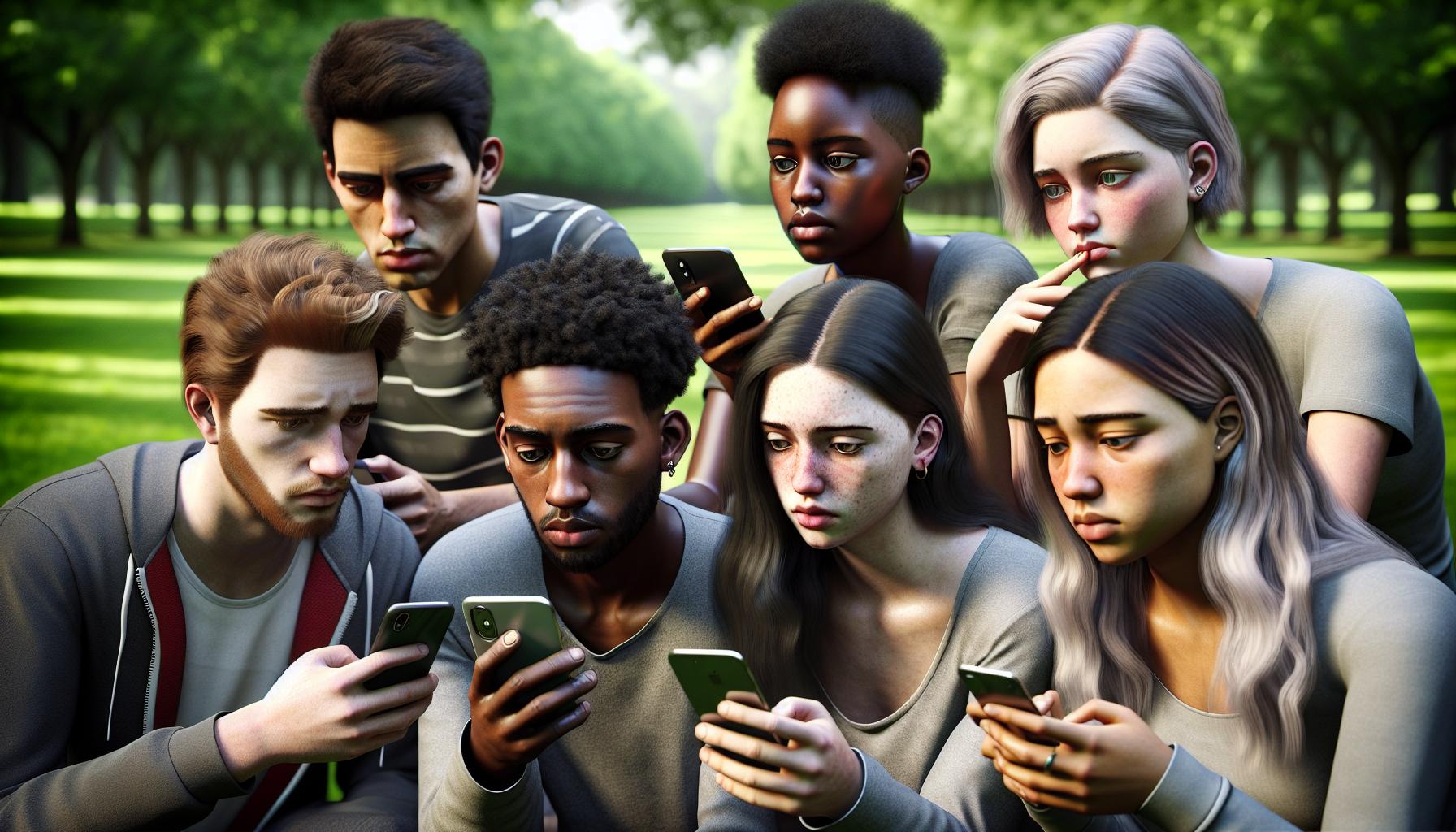Social media has transformed the way people connect and communicate, offering unprecedented opportunities for interaction. However, beneath its glossy surface lies a web of complex issues that can impact mental health, privacy, and societal norms. As users scroll through curated feeds, they often encounter a barrage of unrealistic expectations and misinformation that can distort their perceptions of reality.
The addictive nature of these platforms fosters a cycle of comparison and validation, leading to anxiety and depression for many. Additionally, the erosion of privacy raises concerns about data security and how personal information is used. As society grapples with these challenges, it’s crucial to understand the darker side of social media and its implications for individuals and communities alike.
Key Takeaways
- Mental Health Impact: Social media can exacerbate anxiety and depression through social comparison and exposure to cyberbullying, particularly among teenagers.
- Privacy Issues: Users face significant privacy concerns due to data collection practices, leading to fears of identity theft and misuse of personal information.
- Misinformation Challenge: The rampant spread of misinformation on social media can distort reality and influence public opinion, with false news spreading significantly faster than factual content.
- Changing Communication Norms: Social media has transformed communication, allowing for rapid interactions, but this immediacy can lead to misunderstandings and superficial engagements.
- Political Polarization: These platforms often amplify political polarization by creating echo chambers, limiting exposure to diverse viewpoints and fostering extreme opinions.
- Youth Engagement: A significant percentage of young users, especially teens, are heavily engaged with social media, highlighting the importance of addressing its effects on this demographic.
Issues With Social Media
Social media encompasses various digital platforms enabling users to create, share, and engage with content. Users across global communities participate in diverse activities, from posting photos and videos to joining discussions and streaming live events.
Popular Platforms
- Facebook: Major platform for personal connections, allowing users to share updates and foster relationships.
- Instagram: Focused on visual content, it attracts users through photos, stories, and reels.
- Twitter: Ideal for quick information sharing, it facilitates real-time discussions through tweets.
- TikTok: Dominates short-form video content, encouraging creativity and viral trends.
- LinkedIn: Primarily for professional networking, it connects job seekers with employers and industry peers.
User Demographics
Diverse user demographics represent various age groups and interests. Approximately 72% of teens aged 13 to 17 engage with social media, while 49% of adults over 65 participate actively. Engagement varies, with younger users often focusing on image and video platforms and older generations utilizing professional networks.
Impact on Communication
Social media revolutionizes communication by creating instant connectivity. Users can share thoughts and experiences with audiences worldwide, facilitating collaboration and fostering relationships. However, this rapid communication sometimes leads to misunderstandings or conflicts due to a lack of nuanced conversation.
Challenges of Social Media Use
Social media presents several challenges:
- Mental Health Issues: Individuals may experience anxiety and depression from social comparison and cyberbullying.
- Misinformation: Widespread false information can mislead users and distort perceptions of reality.
- Privacy Concerns: Data security breaches compromise users’ personal information, raising alarm regarding privacy rights.
Understanding these aspects of social media illuminates its complex nature. While it offers connectivity and opportunities for expression, addressing the inherent issues becomes critical for users and society.
Common Issues with Social Media

Social media presents several significant challenges that impact users and society. These issues range from privacy concerns to the spread of misinformation.
Privacy Concerns
Privacy concerns arise primarily from data collection practices on social media platforms. Platforms collect extensive personal information through user profiles, posts, and interactions, often without clear user consent. In 2021, 81% of Americans expressed concern about their personal data being misused. Data breaches can expose user information, leading to identity theft and financial loss. Regulations like the General Data Protection Regulation (GDPR) aim to enhance user privacy, yet many platforms still struggle to comply fully.
Cyberbullying
Cyberbullying remains a prevalent issue among social media users, particularly teenagers. Over 36% of individuals aged 12-17 reported experiencing cyberbullying, resulting in serious emotional distress. Victims often face harassment, exclusion, and threats online, impacting their mental health and overall well-being. Social media platforms implement reporting tools and anti-bullying policies; however, their effectiveness in reducing incidents is questionable.
Misinformation and Fake News
Misinformation and fake news significantly affect social media landscapes, influencing public opinion and behavior. A study showed that false news spreads six times faster than factual information on these platforms. Misinformation can lead to harmful consequences, such as vaccine hesitancy and political unrest. Many platforms now employ fact-checkers and algorithms to identify false content, but misinformation continues to proliferate, highlighting the challenge of ensuring reliable information online.
Impact on Mental Health

Social media significantly impacts mental health, often contributing to various psychological issues. Key concerns include anxiety, depression, and self-esteem challenges linked to platform usage.
Anxiety and Depression
Anxiety and depression often arise from social media interactions. Studies indicate that excessive social media use correlates with increased feelings of loneliness and isolation. Users frequently compare their lives to curated portrayals of others’ experiences, leading to feelings of inadequacy and despair. According to a study by the American Journal of Psychiatry, adolescents who spend more than three hours daily on social media face a heightened risk of mental health issues. This scenario highlights the urgent need for users to balance online engagement with real-world connections.
Comparison and Self-Esteem Issues
Comparison and self-esteem issues persist as prominent side effects of social media. Users often feel compelled to present idealized versions of themselves, fueling a cycle of comparison. Research from the Royal Society for Public Health emphasizes that platforms like Instagram contribute to negative self-image and body dissatisfaction among users. Individuals compare their daily lives with the seemingly perfect lifestyles displayed online, which often leads to frustration and lowered self-esteem. Such dynamics can create a hostile environment for personal growth, perpetuating mental health challenges.
Social Media and Society

Social media plays a significant role in shaping societal norms and behaviors, influencing various aspects of human interaction. Its widespread usage has transformed how individuals communicate, engage with news, and express opinions.
Influence on Communication
Social media channels have redefined communication, facilitating instant exchange of information and ideas. They enable users to share content through platforms like Facebook, Instagram, and Twitter. Real-time interactions often lead to quicker information dissemination, making it easier to mobilize communities around issues or events. However, this immediacy sometimes comes at the expense of thoughtful discourse, where superficial engagement outweighs meaningful conversation. Research indicates that digital communication can diminish face-to-face social skills, leading to challenges in interpersonal relationships. A study conducted by the Pew Research Center found that 53% of teens believe constant connectivity hinders their ability to engage deeply with others. Thus, while social media enhances connectivity, it can also weaken the quality of communication.
Political Polarization
Social media contributes significantly to political polarization, as users often gravitate toward echo chambers that reinforce their beliefs. Algorithms prioritize content that aligns with users’ preferences, thus limiting exposure to diverse viewpoints. This selective information consumption fosters extreme opinions and diminishes tolerance for opposing perspectives. A 2020 study revealed that 64% of Americans felt political discussions on social media have become more contentious, reflecting the platform’s role in amplifying divisive narratives. Furthermore, misinformation campaigns on social media often exploit emotional responses, exacerbating division across political lines. These dynamics create an environment where constructive dialogue becomes increasingly difficult, undermining the foundational principles of democratic societies.
Social Media’s Dual Nature
Social media’s dual nature presents both remarkable opportunities and significant challenges. As users navigate these platforms, awareness of the potential pitfalls is crucial. Mental health concerns privacy issues and the spread of misinformation can deeply affect individuals and society at large.
Balancing online engagement with real-world interactions is essential for maintaining mental well-being. By fostering critical thinking and promoting healthy online habits users can mitigate the adverse effects of social media. It’s important to cultivate a more informed and responsible digital environment that encourages meaningful connections while safeguarding mental health and privacy.